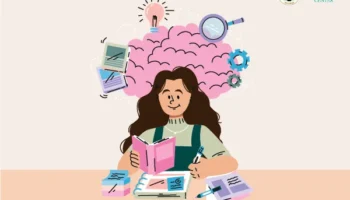3 Ways Meditation Helps Your Mental Health
The Nystrom & Associates provider consulted for this article is Holly Oachs, MA, Outpatient Therapist.
Meditation is an ancient practice of cultivating inner peace. People have been meditating for thousands of years to cope with stress and train their attention. Meditation can be different for everyone depending on your journey and what works best for you. So, try not to let it daunt you, and let’s dive into how meditation helps your mental health.
Related: How to Reset Your Mindset
What is Meditation?
Essentially, meditation is the art of discovering the present moment. It’s training your brain through stillness to become mindful. The goal is to bring your awareness to the present moment without distracting thoughts. Humans have 6,200 thoughts per day. Most of those thoughts are either reliving the past or worrying about the future. Whether it’s thinking about your plans for the weekend, that you forgot to pack a lunch, or guilt for not spending time with a loved one - our minds are constantly switching gears. When it comes to mental health, it’s important for your brain (and body) to take a break from the parade of thoughts and just, be. The great thing about meditation is that it can be personalized. It’s not a one-size-fits-all practice, and you certainly do not need to sit in silence for an hour to meditate. Whether you want to meditate for a couple of minutes or twenty, it’s up to you and what you have time for. Holly Oachs, Outpatient Therapist at Nystrom & Associates, expands on her practice:Personally, I meditate almost every night! Most of the time, I use a meditation app which guides me to be aware of my breathing, helps me scan my body, calm my thoughts, and improves my quality of sleep. I use a meditation app that supports my personal faith beliefs.Related: Mental Health Awareness
Reduce Stress
First, meditation helps your mental health by reducing stress. Since you are taking a moment to calm your mind and focus on your breathing, it also relaxes your body and reduces stress levels. Meditation promotes inner peace and can help manage symptoms of anxiety and depression. However, it's important not to judge your meditation practice. The point of doing it is to reduce stress, not stress yourself out by overthinking the process. Let go of any expectations and try to clear your mind when you go to meditate.Improve Sleep
Before you hit the hay, your thoughts might be racing of your lengthy to-do list or current problems, which affects the quality of your sleep. Regular meditation can reduce sleep disturbances through a deep relaxation response. When you have a good night's sleep, you're more likely to show up productive and ready to tackle what the following day throws your way.Regulate Negative Emotions
When implemented regularly, meditation helps you to increase your emotional intelligence. Several studies have shown that meditation has a positive impact on enhancing emotional mental health. Even if you are not naturally mindful, with practice, you can develop those skills. So the next time you are faced with a stressful situation you may be more likely to pause and react differently than in the past. Related: How Therapy Helps With DepressionMeditation Tips
The hardest part of meditating? Starting. Here are some tips to get you in the mood to meditate:- Keep it simple: Meditation helps your mental health when you keep it simple. Focus on your breathing, and try to let go of your thoughts. When they pop up, observe it and keep trying to clear your head. It might help to visualize the thought floating away and then return to your breath.
- Make it a routine: Set a time and stick to it. Not only does this create a habit, but it helps you ease it into your day instead of it feeling like a chore.
- Pick a place: Have a spot ready for you whether it’s a comfortable chair, a soft rug on the floor, or a yoga mat. The only requirement is to be sure to sit up straight and limit distractions. The whole point of meditation is to sit with yourself and pay attention to your inner world, so really, it can be done anywhere.
- Use an app: Beginner? No problem. There are plenty of apps available to help guide you through your practice. There are ones that are guided with an instructor, soft music, or calming waves. Try out a few different versions and see if it helps you through the process.
- Get creative: Meditation doesn’t necessarily mean you have to sit in silence. Try going for a walk where you pay attention to your surroundings (no headphones), observe how your body feels and where your thoughts wander. Mindful eating is another creative way to ‘meditate.’ Instead of rushing through your meal, intentionally slow down to enjoy the experience when you’re alone. Observe the texture, temperature, and taste.







